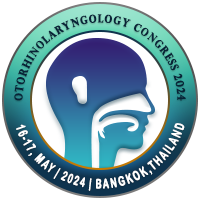
Renad Alsolamy
King Saud bin Abdulaziz University , Saudi ArabiaTitle: Effectiveness of Betahistine as Add-on Therapy to Epley Maneuver for Posterior Benign Paroxysmal Positional Vertigo: A Systematic Review and Meta Analysis
Abstract
Background: Benign paroxysmal positional vertigo (BPPV) is the most common cause of peripheral vertigo, and the Epley maneuver has been established as the most effective treatment method; however, based on recent studies, betahistine has shown to be effective in improving the quality of life in patients with BPPV. The aim of this study was to compare the effectiveness of Epley maneuver with betahistine to the Epley maneuver alone in reducing residual dizziness in BPPV patients.
Methods: We searched Medline, Embase, and CENTRAL. We included randomized controlled trials (RCTs) that compared Epley maneuver with betahistine to Epley maneuver alone for treating individuals diagnosed with BPPV. We sought to evaluate the effectiveness of this intervention on symptom resolution measured by the following outcomes: Dizziness Handicap Inventory (DHI) and the Visual analogue scale for vertigo (VAS) and the objective assessment tools. The standardized mean difference (SMD) was used to represent continuous outcomes.
Results: A total of 6 RCTs with 398 participants were included. Administration of betahistine with Epley maneuver showed no clinically significant difference over Epley maneuver alone in DHI score (SMD: 0.11, 95% CI, -0.47 to 0.68, P =0.71), objective assessment (SMD: -1.05, 95% CI,-2.27 to 0.16, P = 0.09), or VAS scores (SMD: 0.57, 95% CI, -0.43 to 1.57, P = 0.26). when data were taken after 1 week of betahistine administration. However, participants who received betahistine combined with Epley maneuver showed statistically significant reduction in VAS scores when data were taken based on latest follow-up visits (SMD: 0.89, 95% CI, 0.49 to 1.30, P <0.0001).
Conclusions: our recommendation towards the prescription of betahistine with Epley maneuver on regular basis is still modest. However, further clinical trials with a longer follow-up periods are needed to unravel the efficacy of this combination and identify its role in patients' management plan.
Biography
Renad Alsolamy is a medical student at King Saud bin Abdulaziz University for Health Sciences, Jeddah, Saudi Arabia. She is interested in ENT, Research, and leadership and currently in senior year of the MBBS program with an excellent academic GPA. Renad completed one month training at National Guard hospital, Jeddah, ENT department. Also, research is a top priority for her as Renad is currently working on multiple systematic reviews, cohorts, and case reports in ENT to be accepted in a high standard journals. Renad participated in several national and international conferences; as well she won first places in both oral and poster presentations at various events.

